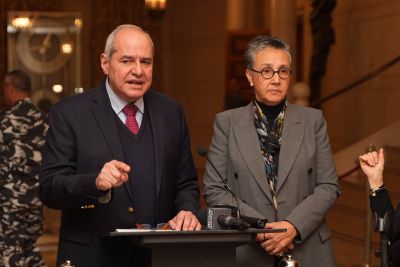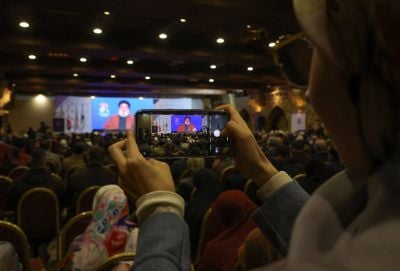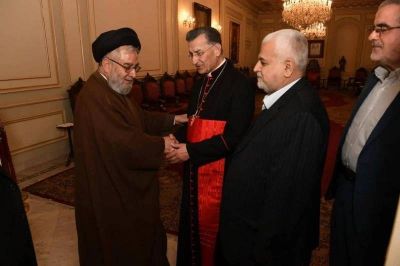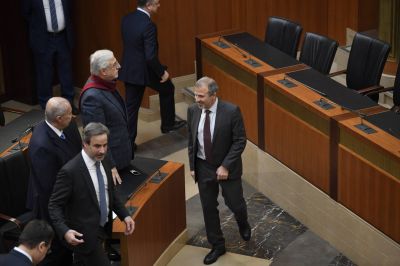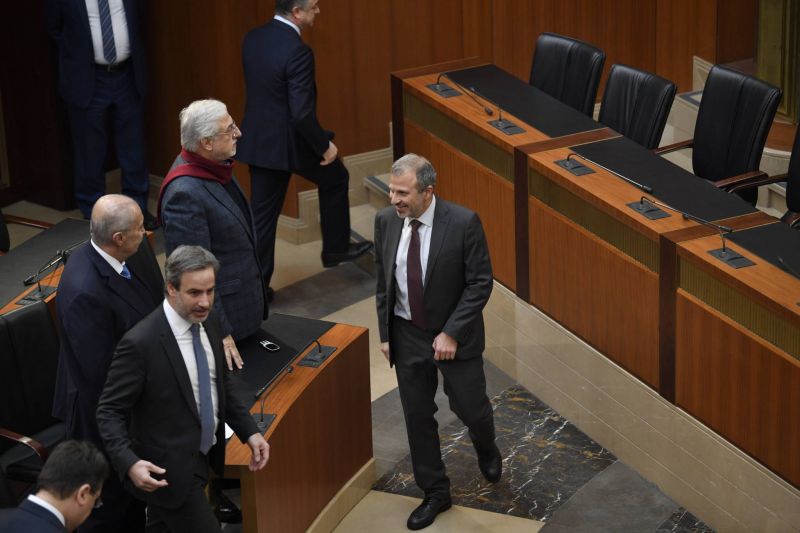
Gebran Bassil (right) and Michel Moawad in Parliament during the session on Jan. 19, 2023. (Credit: Mohammad Yassine/L'Orient-Le Jour)
On Thursday, Parliament once again failed to elect a new president in its eleventh electoral session.
The session yielded 37 blank ballots, 14 spoiled ballots bearing the inscription of “New Lebanon” and 34 ballots cast for Zgharta MP Michel Moawad.
As in the previous ten sessions, Amal and Hezbollah MPs, as well as their allies, withdrew from the chamber after the first round of voting—forcing a lack of quorum in an increasingly desperate political climate.
Parliament was adjourned without Speaker Nabih Berri setting a date for the next session.
L'Orient-Le Jour looks at the three lessons to be learned from this latest attempt to elect a president:
Parliament sit-in
The actions of Forces of Change MPs Melhem Khalaf and Najat Saliba surprised many.
Khalaf and Saliba, who were later joined by their colleagues Firas Hamdan and Cynthia Zarazir, decided to camp out inside Parliament after the adjournment to pressure Berri to hold an open election session until a president is elected.
“Out of respect for the constitutional articles, and to express my commitment to the holding of an electoral session of several rounds without interruption, I decided to stay inside Parliament and not leave until our demand is met,” Khalaf said Thursday in a letter published via his Twitter.
This seemed to dismay Speaker Berri.
“This kind of nonsense does not work with me,” Berri responded on his way out of Parliament.
Shortly after the session, Deputy Speaker Elias Bou Saab met with three independent MPs from Saida and Jezzine.
“Bou Saab assured [us] that Parliament administration will keep the power on and access to water and restrooms [for the MPs staging a sit-in],” Abdul Rahman Bizri, an MP for Saida who was present at the meeting, told L'Orient-Le Jour.
The Forces of Change MPs are not the only ones to have expressed dissatisfaction with Parliament's inaction.
Hadi Abou al-Hosn, MP for Baabda who is aligned with Progressive Social Party (PSP) leader Walid Joumblatt, threatened that his block would boycott any upcoming electoral sessions should the impasse persist.
FPM back to blank vote
Blank ballots won the day at Thursday session after they had ben relegated to second place in the previous session. Their prevalence can be explained by the tension between the Free Patriotic Movement (FPM) and its only ally, Hezbollah.
Hezbollah has adopted a neutral stance until a broader agreement on a presidential candidate takes shape, at least within the March 8 camp.
Marada Movement leader Sleiman Frangieh remains Hezbollah and Amal's preferred candidate, much to the dismay of FPM leader Gebran Bassil. Bassil continues to insist on making his voice heard as the head of Lebanon's largest Christian parliamentary bloc, not to mention his animosity toward Frangieh.
In addition to presidential disagreement, the two sides had a divergent position on the Dec. 5 cabinet session.
Bassil's party deems the holding of the cabinet in direct conflict with Lebanon's National Pact, given the country's ongoing presidential vacancy. The FPM thought it could rely on Hezbollah to kill the session, but it did not.
This disagreement could explain why FPM MPs chose to not vote at Thursday's parliamentary electoral, seemingly sending a message to Hezbollah.
But while Mikati convened another cabinet meeting — held Wednesday — with a green light from Hezbollah, the FPM has shown a willingness to de-escalate.
While seven FPM MPs cast ballots for “presidential priorities,” the rest voted blank—further contributing to the prevalence of blank ballots.
Hezbollah also apparently made a step toward the FPM by limiting Wednesday's cabinet discussion of electricity issues. The cabinet validated treasury advances for Electricite du Liban as requested by FPM-aligned Energy Minister Aounist Walid Fayad.
A reconciliation between the two allies is all the most urgent for Bassil, who finds himself completely isolated on the local political landscape.
Bassil has in fact reached out to his Christian rival, Lebanese Forces (LF) leader Samir Geagea, calling for an inter-Christian dialogue to agree on a consensus presidential candidate.
Geagea ostensibly shut him down in a televised interview.
“They should have voted for Moawad,” the LF leader said. The FPM, however, denied any link between the two issues.
“We suggest the names of several candidates to the different political parties, but to put their names on the ballot box would be to label them politically and undermine their chances,” Rindala Jabbour, an FPM official, said.
Moawad loses ground in favor of 'New Lebanon'
Moawad, supported by most of the opposition MPs, secured only 34 votes— his lowest tally since the electoral timeline began Sept. 1.
During a Wednesday press conference, Moawad said he would continue his presidential campaign unless a sovereigntist candidate emerges with better chances.
“Submission will only lead to more collapse of state institutions,” Moawad said.
Moawad's setback could also be explained by the absence of LF MPs Pierre Bou Assi and Chawki Daccache and PSP MPs Taymour Joumblatt and Akram Chehayeb.
“Michel Moawad's candidacy is still relevant, but today's session was mainly dedicated to the Aug. 4 [explosion] victims,” Razi al-Hajj, Lebanese Forces MP, told L’Orient-Le Jour.
The vote follows the arrest of William Noun, an activist whose brother, Joe Noun, was a firefighter killed in the port blast.
Moawad, the son of the assassinated former president, René Moawad, can count on the support of some 40 MPs in the next session, mainly from the LF (19), the PSP (8), the Kataeb (4) and his Renewal Bloc (4), as well as a few reformist MPs or those affiliated with the protest movement.
“It is no longer a battle of numbers, but a real political battle that we are fighting. We are going to stop counting altogether,” said MP Adib Abdel Massih, who is close to Moawad.
Moreover, some independent MPs and those formerly affiliated with former Prime Minister Saad Hariri — mainly Sunnis — chose to vote for “New Lebanon,” which cut into Moawad's tally.
The “New Lebanon” ballots numbered 14, compared to only six in the last session in mid-December.
“'New Lebanon' is the biggest winner of this session,” MP Bizri, one of the sponsors of this electoral strategy, told L'Orient-Le Jour. “The improvement of our tally is good news since it allows us to expand the centrist space and the dialogue in order to achieve the election of a president for all Lebanese."
L'Orient-Le Jour learned from parliamentary sources that Neemat Frem, MP for Kesrouan, did not vote for Moawad in favor of the so-called centrist camp.
Known for his presidential ambitions, Frem has been multiplying political meetings in recent weeks, including with Geagea.
Is the “opposition” heading for more divisions?
This article was originally published in French in L'Orient-Le Jour. Translation by Sahar Ghoussoub.
